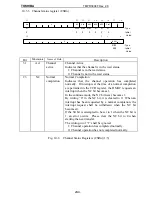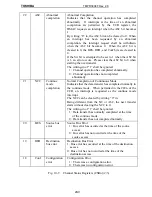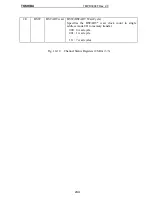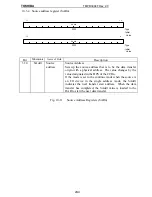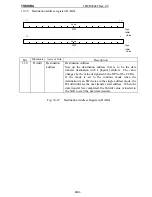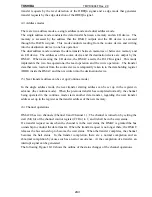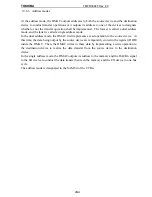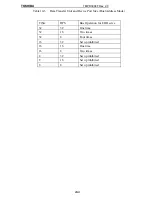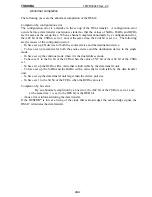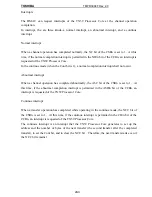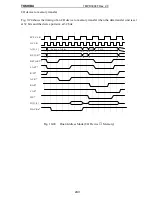
TOSHIBA
TMPR3904F Rev. 2.0
140
26
Level Mode
In the level mode, the internal DREQn signal (dreq) is level-detected at a rising of the internal
clock (GCLK). If the active level is detected in the dreq signal when the channel is in the wait
status, the DMAC switches to the transfer status to start data transfer. The active level of the
DREQn signal is set up in the PosE bit of the CCRn. The active level of the DACKn signal is
the same as the active level of the DREQn signal.
If the external circuit has asserted the DREQn signal, please maintain the DREQn signal at the
active level until the DACKn signal is asserted in the I/O device access cycle. If the DREQn
signal is deasserted before the DACKn signal is asserted, the transfer request may not be
acknowledged.
If the dreq signal is at the active level at a rising of the GCLK that acknowledges the assertion of
the acknowledge signal (which is generated by the on-chip memory controllers at a memory
access in the dual address mode or in the single address mode, or is the same as the ACK* signal
at an I/O access in the dual address mode), the next data transfer is conducted immediately
afterwards. However, if a transfer request is generated on another channel with a higher
priority, a channel transit takes place.
If the dreq signal is not at the active level at a rising of the GCLK that acknowledges the
assertion of the acknowledge signal, it is understood that there is no transfer request so that a
transfer operation on another channel may be started or the bus ownership may be released to
become the wait status.
The acknowledge signal is recognized at the rising edge of the GCLK which precedes the
GCLK cycle when the final LAST* signal for a data transfer is negated.
The unit of the transfer request is designated in the TrSiz field of the CCRn.
S Y S C L K
d r e q
D R E Q n
( B u s o w n e r s h i p r e q u e s t )
( B u s o w n e r s h i p r e l e a s e
n o t i c e )
A [ 3 1 : 1 ]
• A
B E [ 3 : 0 ] *
R / W *
B S T A R T *
A c k n o w l e d g e s i g n a l
D A C K n
D a t a t r a n s f e r
D a t a t r a n s f e r
T h e d r e q , t h e b u s o w n e r s h i p r e q u e s t s i g n a l , t h e b u s o w n e r s h i p r e l e a s e n o t i c e s i g n a l a n d t h e a c k n o w l e d g e
s i g n a l a r e i n t e r n a l s i g n a l s o f t h e T X 3 9 0 4 .
Fig. 10-18 Transfer Request Timing (Level Mode)
Summary of Contents for TMPR3904F
Page 1: ...Users Manual 32bit RISC Microprocessor TX39 family TMPR3904F Rev 2 0 Jan 12 1998 ...
Page 2: ......
Page 9: ...Users Manual 01 1 INTRODUCTION 1 1 Overview ...
Page 11: ...Users Manual 03 1 3 Kind of accessing by the TX3904 ...
Page 12: ...Users Manual 04 1 4 Precautions in the TMPR3904F specification Don t set Don t use ...
Page 13: ...Users Manual 05 Do not use ...
Page 14: ...Users Manual 06 ...
Page 15: ...Users Manual 7 2 FEATURES n n n n n n n n n n n n n ...
Page 16: ...Users Manual 8 ...
Page 18: ...Users Manual 10 ...
Page 19: ...Users Manual 11 4 PINS 4 1 Positions of Pins ...
Page 20: ...Users Manual 12 ...
Page 21: ...Users Manual 13 4 2 Functions of Pins ...
Page 22: ...Users Manual 14 ...
Page 23: ...Users Manual 15 ...
Page 24: ...Users Manual 16 ...
Page 26: ...Users Manual 18 5 2 Register Map ...
Page 27: ...Users Manual 19 ...
Page 28: ...Users Manual 20 ...
Page 30: ...Users Manual 22 5 3 2 PIO2 and PIO1 ...
Page 32: ...Users Manual 24 5 3 4 Connection of external bus master 5 3 5 INT 7 0 active status clear ...
Page 33: ...Users Manual 25 5 3 6 INT 7 0 active status set up ...
Page 34: ...Users Manual 26 ...
Page 123: ...TOSHIBA TMPR3904F Rev 2 0 115 26 ...
Page 169: ...TOSHIBA TMPR3904F Rev 2 0 161 26 ...
Page 203: ...TOSHIBA TMPR3904F Rev 2 0 195 ...
Page 230: ......

